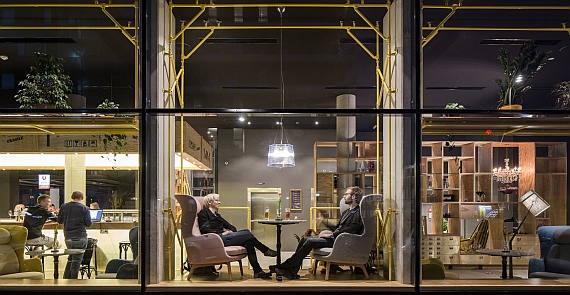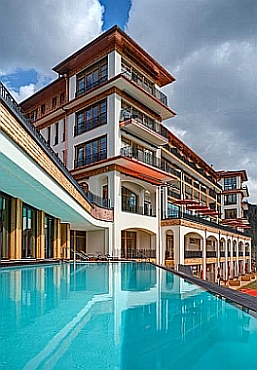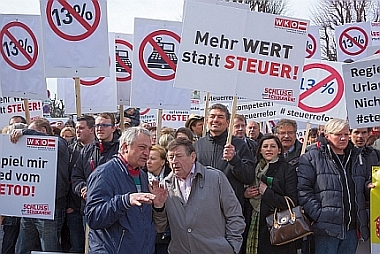
News & Stories
New York. Innovations always played a major role for Starwood, now the hotel group brings together cross-section of the company's digital, design and luxury brand teams in one urban office for the first time. In a completely new atmosphere these teams work together on topics of the future.
Old future
Vienna. The new Hotel Schani in Vienna should be a "Future Hotel"; what has emerged is obviously only the lowest common denominator of the various project parties. The mega innovations that one expects of the leading Fraunhofer Research Institute are not visible or are nominally convincing. Particularly not when envisioning the seven years that lay between the planning and implementation on the part of Frauenhofer! The family-controlled 3-star hotel in the new Viennese Central Station will absolutely benefit from its label as a "Research Project" and additionally, many travellers will be pleased with the rooms and the value for money.
Milan. People offering accommodations online are often professional players and not simply citizens aiming at supplementing their monthly revenue. Moreover, these unconventional accommodations are not necessarily targeting a low budget segment; availabilities are suitable for every pocket. A recent survey on the alternative hospitality segment in Milan sheds light on the sharing economy activities in the city of Expo 2015.
Eschborn. The purchasing company Progros is currently experiencing an enormous upswing in consulting within its business for procurement solutions for the hotel industry. At the same time, the company is expanding within Europe with more and more smaller chains using its services.
Vienna. The recently resolved smoking ban requires a three year transition period before implementation, and won't enter into force until May 2018. From then on, a general smoking ban will apply in the catering sector.
Mittenwald/Kruen/Klais. "Without the G7 Summit, the retreat would cost many millions less." At times, Dietmar Mueller-Elmau, owner of Schloss Elmau near Garmisch-Partenkirchen, is torn in half by the curse and blessing of the imminent political summit at his castle hotel. Which president will receive which suite on June 7-8, 2015 will be personally established in an advance visit by the German Chancellor, Angela Merkel. The new domicile for the heads of state, the "Schloss Elmau Retreat - Luxury Suites & Spa", officially opened four weeks ago. It had been planned for a long time. A sensitive, thought-out microcosm has originated in the aura of the Schloss Elmau - Luxury Spa & Cultural Hideaway. Hotelier colleague, Dr. Jakob Edinger, owner of the wellness resort, Das Kranzbach, two kilometres way, will not stand in the media fire of the G7 events, but will nevertheless exclusively accommodate summit participants. His daily life is not quite as difficult.
Vienna. Austria's governing coalition partners SPÖ and ÖVP are current working on a tax reform bill which includes a hefty rise to VAT for the hotel industry. Under current plans, VAT will rise from 10 to 13 percent. Enough to put the entire industry into a rage, not least because hotels feel deceived by "their" Economy and self-declared Tourism Minister, Vice Chancellor Reinhold Mitterlehner. Current sector data provide the furious hotel owners with a whole range of ammunition. Around 500 business people from the tourism industry attended a first demonstration in Vienna on March 17th, yesterday there was another demonstration with 2,000 participants in Innsbruck.
Berne. The hotel industry in Switzerland is going through hard times; now, hoteliers are able to convert half of their property into second homes. However, this is more beneficial to city hotels than hotels in the countryside. At the same time, the first politicians are demanding tourism taxes from Airbnb & Co.
Paris. Is the idea of having a unique hotel classification throughout Europe one step closer to reality? Well, the Hotelstars Union would love to think we are almost there.
Vienna. It is bubbling up in the pots of the hotel industry. From luxury to budget, every segment is experimenting with new F&B concepts and already taking unusual paths. Even the service staff members are being manoeuvred. Ultimately, the "plate carrier" is being disused. Romana Kanzian has examined a number of hotel concepts and filtered out their ingredients. What is loose, fun and good, authentic and on the regional level is successful and allows for the gastronomic spaces to flow and makes the staff happy. And from now on, the hotel gastronomy is also looking for the best – the best Sommelier, Pâtissier, Bar Man or Barista.




